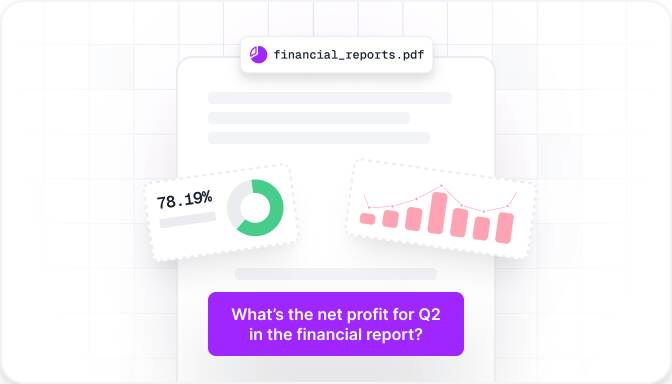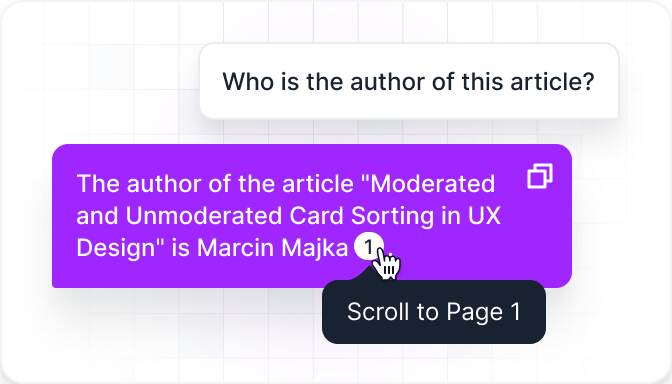Sign up for free to save your chat history
#1 PDF Chat AI
Q's answered every day
Gen AI apps of 2024
AI Scholar
The clever way to use AI for research. Find papers, understand complex ideas,
and extract valuable findings — all backed by reliable sources.
Trusted by students and researchers
from top institutions
Why AI Scholar?
Get clear, research-backed answers you can trust – see the sources, no AI hallucinations.
High quality papers
Find the best research papers from top–ranked journals in seconds.

Chat with papers
Ask your question and the research paper will answer.

Summary with citations
Our AI summary distills research findings and includes citations, ensuring accuracy.

Filter your search
Find the most recent and influential research papers by using our advanced filtering options.

Frequently Asked Questions
How can I write effective search queries for AI Scholar?
Thanks to the advanced AI capabilities of our AI scholar, you can search using either full-sentence questions or just keywords.
How do researchers use AI Scholar?
Researchers use Scholar AI to quickly find the most relevant and up-to-date research papers on their topics of interest. By entering keywords, they receive AI-enriched summaries that highlight key findings while citing original sources—ensuring accuracy without hallucinations. Additionally, they can chat with the papers, allowing them to explore specific insights, ask follow-up questions, and understand how different studies relate to their research.
What are the limitations of Scholar AI?
Scholar AI focuses solely on academic literature, meaning it does not generate answers beyond what is explicitly stated in research papers. It may struggle with fact-based questions, such as "What is the current population of Tokyo?". Additionally, the chat feature is only available for open-access papers, limiting interaction with paywalled research.
Is Scholar AI reading all the papers?
Scholar AI generates summaries based on abstracts, as they distill papers into their core findings, offering more reliable insights by avoiding less substantiated sentences within the full text. The chat under the summary interacts with the abstracts, while the 'Chat with Paper' feature allows you to engage with the entire paper.
How Accurate is Scholar AI?
Scholar AI derives its findings directly from the abstracts of the scientific papers it analyzes, achieving over 90% accuracy in our tests. However, like all AI, it is not infallible. To ensure transparency, every claim is linked to its source, allowing you to verify the information—something we always recommend.
Is AI Scholar free?
For now we allow unlimited access to AI Scholar.
What journal rankings are you using?
We use the Scimago Journal Rank (SJR), which categorizes academic journals into four quartiles (Q1–Q4) based on their impact. A Q1 ranking indicates that a journal is among the top 25% in its field.
Why are some journal rankings not available?
Keep in mind that not every journal is included in the Scimago Journal Rank (SJR), and some older journals or books may not be listed in the 2023 rankings.
How do I chat with a research paper PDF?
Below the research paper is a "Chat with PDF" button. This button is only available for open access research paper.
How do you rank research papers?
Research papers are evaluated according to several factors, including their publication venue, their authors, and how frequently they are cited.
How does AI Scholar handle newly published research?
AI Scholar frequently updates its database to include the latest open-access articles. You can search for recently published work by refining your query with publication dates, ensuring you always have access to the most current findings.
Are preprints included in AI Scholar's database?
Yes, AI Scholar indexes some preprint repositories for early research access. However, not all preprints are included, so it's best to check multiple sources if you need comprehensive coverage.
What do quartile rankings mean in AI Scholar results?
Quartile rankings (Q1–Q4) indicate a journal's relative influence, as defined by the Scimago Journal Rank (SJR). Q1 represents the top 25% of journals by impact, helping you quickly identify high-quality publications.
Can I filter AI Scholar search results by publication year?
Yes! Simply use the 'Filter by Year' button located to the right of the search bar to refine your results.
What languages does AI Scholar support for research papers?
AI Scholar supports research papers in all languages. You can search for and access papers written in any language, making it a truly global research tool.
How do I properly cite information from AI Scholar?
Always cite the original research paper rather than AI Scholar itself. AI Scholar provides summaries and direct references, so you can locate and reference the original authors' work.
What are the benefits of abstract-based summarization in AI Scholar?
By focusing on abstracts, AI Scholar consolidates core insights and reduces misleading information. This approach boosts reliability and speeds up your literature review process.
Does AI Scholar detect plagiarism or duplicated content in research papers?
AI Scholar does not function as a plagiarism checker. It focuses on summarizing and ranking academic literature, so users seeking plagiarism detection should use specialized tools.
How do I use advanced search operators in AI Scholar?
Leverage keywords, Boolean operators (AND, OR, NOT), and quotation marks for exact phrases to refine your results. Combining these techniques helps you pinpoint highly relevant articles.
How is my data privacy protected when using AI Scholar?
AI Scholar only processes user queries to generate relevant research results. Personal or sensitive information is not stored or shared, ensuring a secure and private search experience.